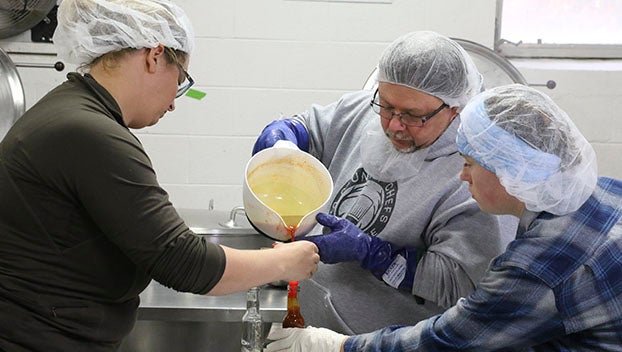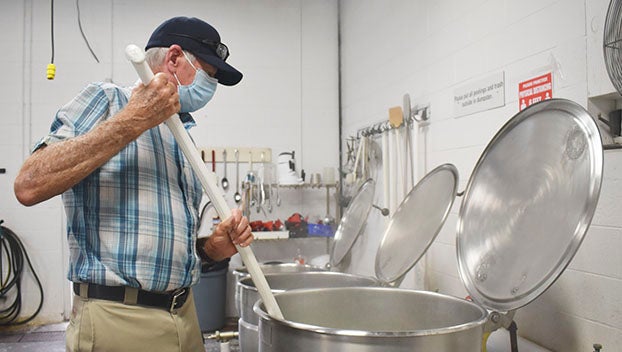State helps Prince Edward County Cannery fund improvements
Published 6:46 pm Friday, January 27, 2023
|
Getting your Trinity Audio player ready...
|
FARMVILLE – Home canners, hobbyists and small businesses alike can officially get excited: the Prince Edward County Cannery just received a large state-funded grant, and with it, various impressive improvements are able to be made to the facility to further the mission for community canning.
Canning has long been an important tradition. For centuries, home canners would preserve their fare for the long winters ahead to ensure their families had adequate food to survive the long, cold months. It was simply a way of life.
Today, home canning has become commonplace and is growing in popularity among 30 somethings and homemakers looking to learn everything there is to know about food preservation and self-sustainability. Courses on home canning abound online, teaching those interested all they need to know about canning. It can be difficult to know what advice to follow and who to listen to. With today’s convenience of simply shopping at the grocery store, many people rely on what’s available in-store rather than self-preservation. Hence why community canneries have become a dying art.
The cannery in Prince Edward County functions as a dual-purpose facility: one part for home canning, and the other part for commercial opportunities. The regular home canning section helps home canners and hobbyists preserve goods from their backyard gardens – things such as greens, corn, tomatoes, soups, and stews are all able to be preserved safely in tin cans. On the home canning side, there are no glass jars allowed.
“One of the biggest reasons for that is it’s safer to process in tin,” said Virginia Food Works Director Hannah Evans. Virginia Food Works handles contract packing and other operations at the cannery.
The Prince Edward County Cannery history
The doors of the cannery opened in 1975, and since then, it has held its own and grown in popularity. It is one of the only canneries left for community use in the country.
“Community canneries are a dying art,” Evans said. “It’s an amazing place.”
Patty Gullich, who oversees the home canning side of the cannery, has been with the cannery for quite some time. She was with the commercial side of things before overseeing the home canning portion. Gullich is incredibly knowledgeable and loves to help all who desire to learn all there is to know about the canning process. She helps home canners and members of the community with approved processes and recipes.
On the home canning side, there are seven steam jacketed kettles available for members of the community to use. Some people come in with just a small bit of food, while others come in with 5-gallon buckets. Most of the people who visit the cannery are local, while others travel from long distances out of the area to use the service. The home canning portion of the facility is open by appointment only every Monday, Tuesday and Wednesday from June through December.
On the commercial side of the cannery, there is a much different process involved.
“Our process on this side looks completely different from the home canning side,” Evans said. Why? There are various FDA regulations that need to be adhered to, while adequate pH levels and critical control methods must be followed. Glass jars are utilized on the commercial side of things. Licensed by the Virginia Department of Agriculture, and certified for acidified foods, the Prince Edward County Cannery is as much of an interesting conversation piece as it is a functional building in the community that benefits locals and businesses alike.
A look at the commercial side
On the commercial side, the types of food products you’d typically see canned are everything from jams, hot sauces, jellies, and anything vinegar based. The process consists of what is known as a hot fill hold process.
One of the most exciting recent developments for the cannery is the $50,000.00 grant the facility recently received from the state for multi-faceted improvements.
Last year, a similar grant was awarded to the cannery, and it was used to replace the original boiler from when the facility opened back in the 1970’s.
“After 40+ years, it was time to go,” Evans said.
The steam boiler powers the entire facility – and thus, the importance of a properly functioning boiler is essential to the safety and success of the facility.
The newly received grant will be used to replace piping throughout the facility, and other various improvements that will need to be made.
In terms of cost, there is a $1 one-time fee to utilize the cannery for locals. You will also need to pay a set fee per can. The fee per can is discounted if you belong to one of the local counties surrounding the cannery.
For more information, or to schedule an appointment, you can reach Hannah Evans or Patty Gullich at info@virginiafoodworks.org, or you can call (401) 864-0402.






